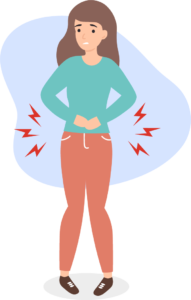RESEARCH

Inspire research reveals important insights among women living with interstitial cystitis/bladder pain syndrome
12 million Americans, mostly women, live with interstitial cystitis/bladder pain syndrome (IC/BPS). IC/BPS is a complex chronic pelvic pain condition.
As part of a funded research grant, Inspire conducted a research study among members of the Inspire Interstitial Cystitis Association Community.
Inspire researchers analyzed 3,232 posts from the Inspire online health community using natural language processing and social media listening research methodology. From this, Inspire was able to identify key themes among women living with IC/BPS.
These themes shed much-needed light on this often-misunderstood condition. The findings can be used to help improve diagnosis and treatment of IC/BPS in the future.
The results were first published at the American Public Health Association’s 2022 Annual Meeting & Expo.A
Medical gaslighting is a common theme among women managing chronic pelvic pain
Because symptoms vary from case to case and even in the same individual, IC/BPS can be difficult to diagnose. Healthcare providers must often rule out other conditions before considering IC/BPS.
Inspire research reveals that medical gaslighting and negative experiences with healthcare providers is common among women who are seeking treatment for IC/BPS.
Women reported discouraging reactions from the medical community, which affected their mindset or left them feeling on edge. In some cases, adverse reactions to medications were not responded to quickly. Misunderstandings around IC/BPS resulted in women receiving lower quality care.
The healthcare community can use these findings to improve care for IC/BPS. Healthcare providers may consider improving their understanding of IC/BPS, incorporating female hormones into care decisions, and pursuing systemic solutions over the treatment of individual systems.
“I kept telling my doctors the pain was from my bladder, but they didn’t seem to believe me.”
— Interstitial Cystitis Association Community Member
Diet is the most frequently reported trigger of interstitial cystitis/bladder pain syndrome flares
Inspire’s analysis categorized IC/BPS triggers into 17 different categories, including diet, sexual intercourse, comorbidities, menstruation, and more. The analysis revealed that diet accounted for the largest proportion of triggers, contributing to nearly a third (32%) of all flares.
There are limited treatment options for IC/BPS, and dietary changes are not often discussed with patients. Even in cases when diet is discussed, individuals are left to figure out which foods and beverages trigger their symptoms on their own.
To better treat IC/BPS, healthcare professionals and patients should discuss dietary changes as a treatment option. As triggers vary from person to person, healthcare professionals can support patients as they individualize the IC/BPS diet to their own experience of trigger foods and drinks over time.
1https://www.niddk.nih.gov/-/media/Files/Urologic-Diseases/IC_PBS_T_508.pdf
